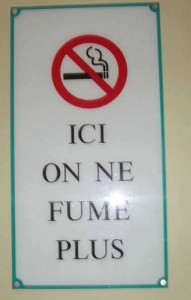As I keep saying, speaking French fluently and accurately is all about mastering many subtleties and intricacies. Today’s post is a study in how French can be tricky.
Just how does one pronounce the word plus in the example Ici on ne fume plus in the accompanying picture? Is it with an s sound as in “plusse” or more like “plu” with no s? It depends on context and meaning. The full answer is going to be a bit complicated because it will take us down a winding road into the intricacies of French grammar and semantics.
First of all, remember that in French, generally speaking, consonants at the end of a word are not pronounced. This is very different from English and Spanish. For example, son, sons and sont are pronounced exactly the same. So are fond, fonds and font.
Final s is very common in French because adding s is the most common way of making a noun plural, but that final s is not pronounced.
As for singular words ending in s, the s is usually not pronounced. For example: le jus, le pus, le fonds.
There is, however, a small number of words that do pronounce the s in the singular form: Vénus, Uranus, Mars, l’autobus, le fils (the son), le laps, le lys, l’os, l’ours, le sens, le terminus and la vis.
A. Pronunciation as “plusse”
1. Arithmetic operations
Deux plus deux font quatre (Two plus two are four.)
2. Meaning “more, greater than, plus”
Elle a plus d’argent que moi. (She has more money than me.)
Un peu plus de sauce? (A bit more sauce?)
C’est un plus pour nous. (It’s a plus for us.)
Je aime celui-ci plus que l’autre. (I like this one more than the other.)
3. When “plus” is at the end of a phrase or a sentence.
Donnez-moi un peu plus. (Give me a bit more.)
J’en veux plus (I want some more.)
But note:
Je n’en veux plus (plu). (I don’t want anymore.)
B. Pronunciation as “plu”
1. Before words starting with a consonant.
Il est plus grand que moi. (He is taller than I am.)
La situation est plus compliquée que je croyais. (The situation is more complicated than I thought.)
2. Plus meaning “no more, not anymore, only, no longer” in the negation “ne…plus”
Il ne veut plus vous voir. (He doesn’t want to see you anymore.)
Je ne comprends plus rien. (I don’t understand a thing.)
Il n’y a plus rien à faire. (There’s nothing more to do.)
Je ne t’aime plus. (I don’t love you anymore.)
Plus bête que lui, ça n’existe pas. (You weren’t find anyone dumber than him.)
In the photograph, the plus would most likely be pronounced as “plu.”
Here is a typical dialogue:
–Est-ce qu’il vous reste des billets pour ce soir? (Do you have any tickets for this evening?)
–Désolé, il ne m’en reste plus. (I’m sorrry. There are none left.)
The following examples can be a bit confusing. This construction is often seen on signs and in advertising. Here, “plus que” means “only.” and is an abbreviation of “il n’y a plus que.”
Plus que deux représentations. (Only two shows remaining.)
Plus que trois semaines avant Noël. (Only three weeks before Christmas.)
C. Pronunciation as “pluze” because of liaison
A complication in all of this is the presence of liaison in spoken French. As most readers know, a final consonant in a word will connect (liaison) with a following word that starts with a vowel or a silent h. That final s will be sounded as a z. The best known example is probably the articles where les enfants will be pronounced les-z-enfants and mes anciens amis becomes mes-z-anciens-z-amis.
In the case of plus, this liaison rule will generate that z sound in phrases like:
De plus en plus (more and more),
Plus ou moins (More or less)
Qui plus est (And furthermore)
Il ne travaille plus ici. (He no longer works here.)
Elle est plus en forme que moi. (She is in better shape than I am.)
D. Expressions with variable usage
In the following idiomatic expressions, usage will vary according to the contexts as outlined above or may even hesitate:
au plus, bien plus, d’autant plus, de plus, en plus, en plus de, rien de plus, sans plus, tant et plus and tout au plus.
Here are some examples:
En plus, il est arrivé en retard. (To add to that, he arrived late.)
Sans plus (plu) tarder, je vous présente notre conférencier. (Without further ado, here is our main speaker.)
Quelques nouveautés, mais sans plus (plusse). (Some new items, but nothing more.)
Although the whole thing looks complicated, in reality it’s not that bad. Right off the bat, the liaison rule takes care of many situations. The rest of the time the choice is really based on meaning. After you’ve seen enough examples, you will spontaneously develop a feel for the right pronunciation.
Stanley Aléong is a polyglot, author, musician and language coach in French, English and Spanish. He likes to share his passion for languages and believes that anybody can learn to speak a foreign language well with the right methods and tools. He has also invented a cool visual learning tool called the Language Wall Chart Calendar that is based on his own learning experience. Reach him at info@langcal.com.

